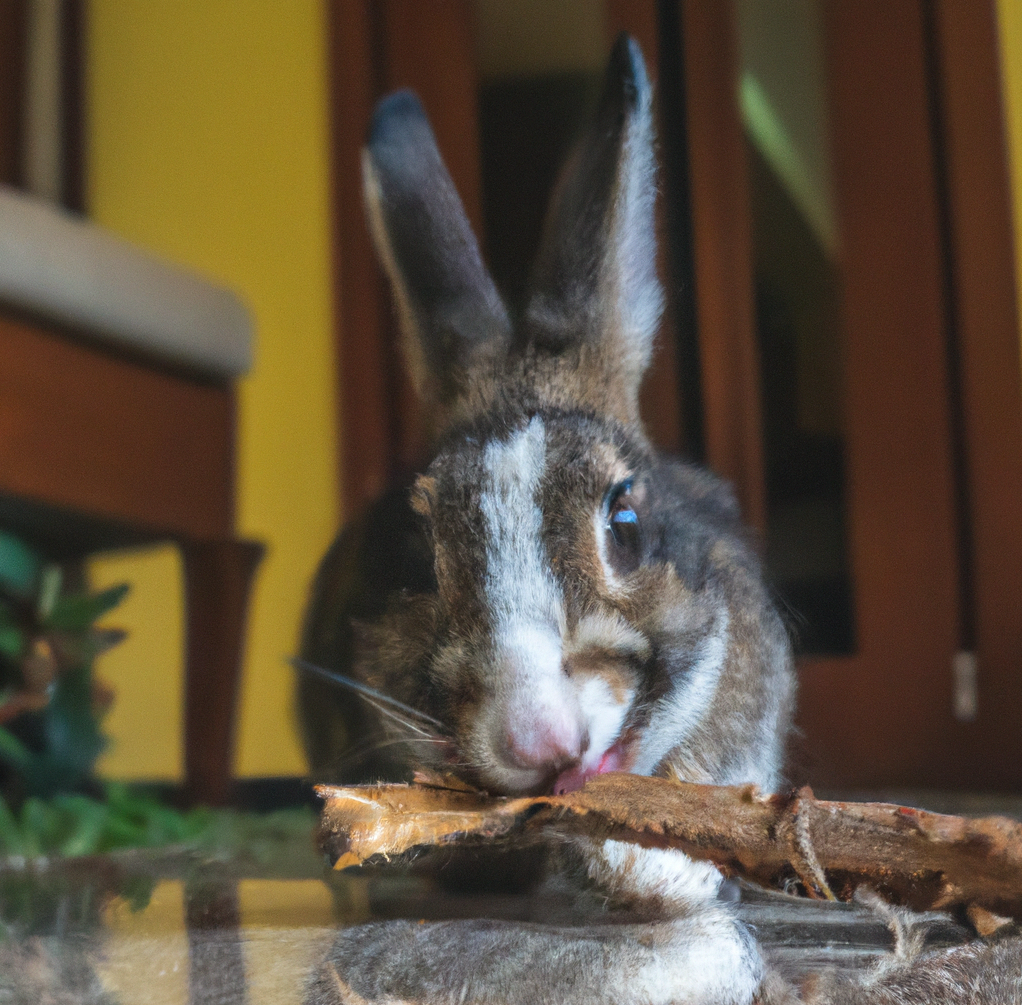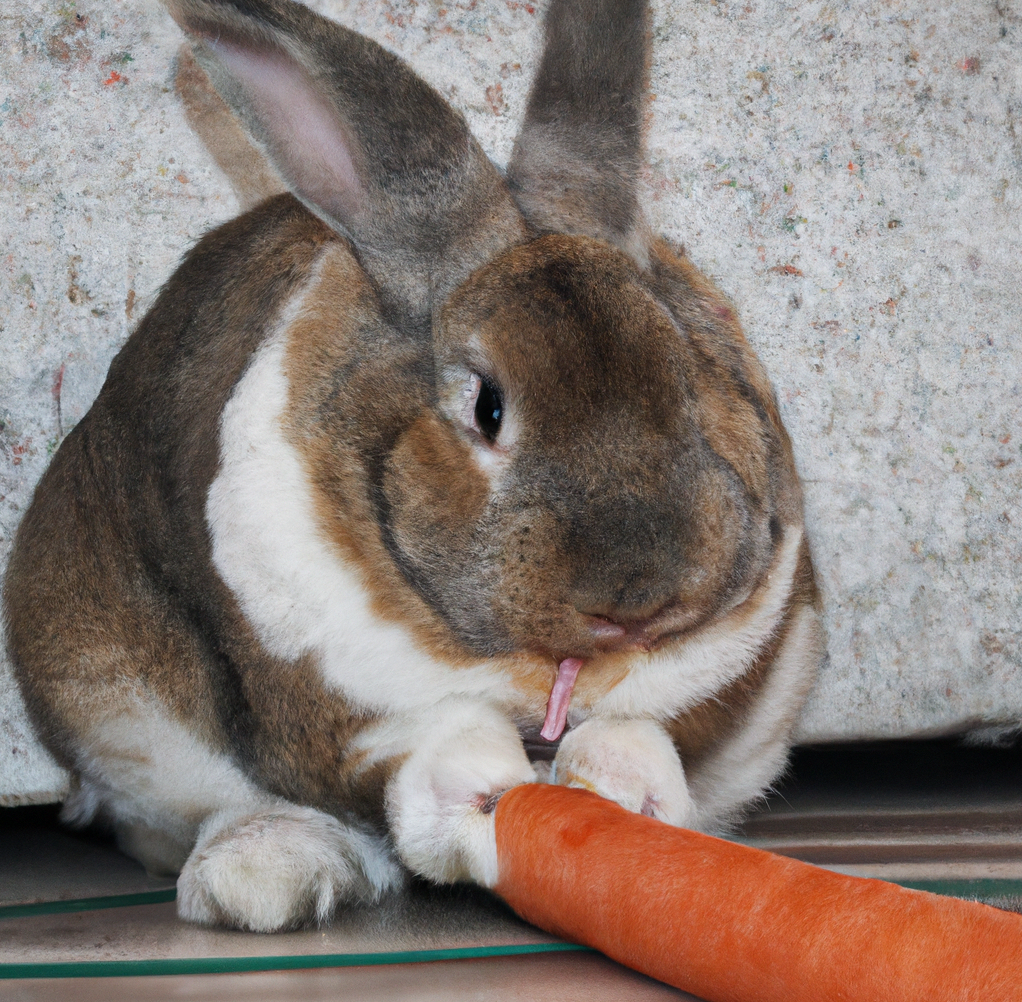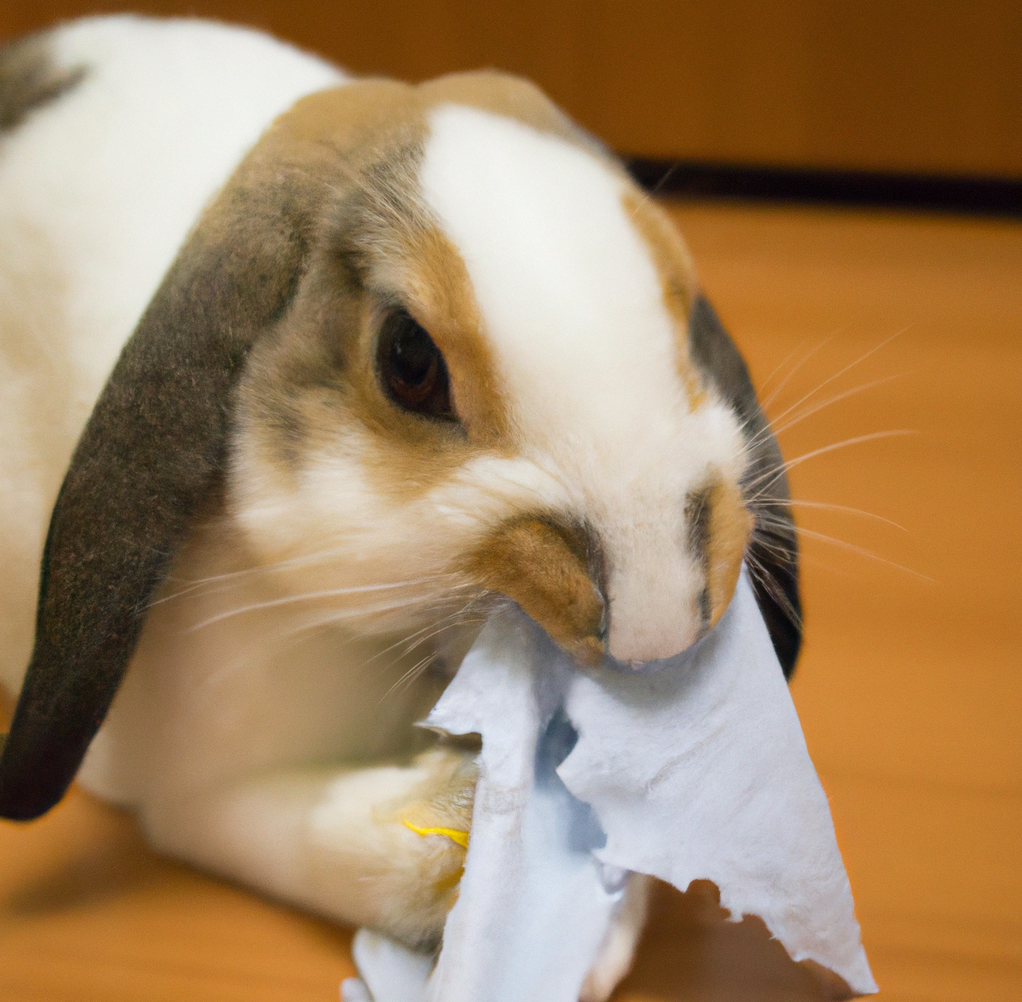If you are a pet rabbit owner, you may be feeling frustrated and confused about why your normally docile pet rabbit is suddenly exhibiting destructive behavior. While rabbits are generally gentle and playful creatures, the sudden onset of destructive behavior can be a sign that something is wrong and needs to be addressed. In this article, we will look at the possible causes of your pet rabbit’s destructive behavior and how to address it.
The Causes of Sudden Destructive Behavior in Pet Rabbits
Sudden destructive behavior in pet rabbits is often a sign of distress and can be caused by several factors. The most common causes include the animal’s environment, diet, and mental state.
The environment can play a significant role in a rabbit’s behavior. Rabbits are very sensitive creatures and can become distressed if their environment is too noisy or too cramped. An improper cage size, inadequate bedding material, or a lack of hiding places can all trigger destructive behavior. Additionally, sudden changes in the environment can cause significant stress, and rabbits may act out as a result.
Diet is also an important factor in a rabbit’s behavior. If a rabbit’s diet is too high in sugar or carbohydrates, they can become hyperactive and start to act destructively. Rabbits need a balanced diet of hay, pellets, and fresh vegetables in order to maintain a healthy lifestyle.
Finally, rabbits can act out if they experience mental distress. This can be caused by separation anxiety, boredom, or even a lack of attention from their owners. Ensuring that rabbits have plenty of opportunities for play and exercise can help to alleviate these issues.
In conclusion, sudden destructive behavior in pet rabbits can be caused by a variety of factors, ranging from diet to environment to mental state. Understanding what is causing the behavior is the first step in helping to manage it.
How to Discourage Destructive Behavior in Pet Rabbits
Rabbits can be wonderful, affectionate pets if given the right care and attention. However, their natural curiosity and love of chewing can lead to destructive behavior, such as chewing up furniture or carpeting. To discourage this behavior, it is important to understand what motivates it and how to redirect it.
First and foremost, rabbits need plenty of space to explore and play, so it is important to give your pet plenty of room. Line the bottom of the cage with hay, which rabbits love to chew on, and provide plenty of toys for them to play with. Make sure the toys are made of materials that your rabbit can safely chew on, such as wood, cardboard, or untreated wicker.
Providing your rabbit with plenty of exercise is also important. Rabbits need at least two hours of playtime outside of their cage each day. Make sure to provide them with a safe space to explore, such as a large pen or a room that has been bunny-proofed. This will help them stay active and give them things to do other than chew on your furniture or carpet.
It is also important to make sure that your rabbit has enough food and water available. If your rabbit is not getting enough nutrition, it may resort to chewing on furniture or carpeting out of boredom or hunger. Make sure to feed your rabbit a well-balanced diet of hay, fresh vegetables, and pellets, and provide them with fresh water daily.
Finally, it is important to give your rabbit plenty of attention and affection. Rabbits are social creatures and will often display destructive behavior if they are feeling neglected or isolated. Spend time with your rabbit every day, petting them and playing with them. This will help ensure that they are getting the attention they need and will help reduce the likelihood of destructive behavior.
By following these tips, you can help ensure that your rabbit is a happy, healthy pet and will be less likely to engage in destructive behavior.
Understanding Your Pet Rabbit’s Natural Instincts to Chew and Dig

Pet rabbits are unique animals that require an understanding of their natural instincts to ensure their health and wellbeing. One of the most important instinctive behaviors of rabbits is their instinct to chew and dig. It is important to recognize these behaviors and provide suitable outlets for them in your pet’s environment.
Chewing is a natural behavior for rabbits and is essential for the health of their teeth. Rabbits have continuously growing teeth, so chewing helps to wear the teeth down and keep them trim. Without sufficient opportunities for chewing, the teeth can become overgrown and cause serious health issues for your pet.
Providing your rabbit with a variety of safe chew toys is essential for their dental health. Suitable toys include hay cubes, wood blocks, and natural tree branches. These toys should be regularly rotated to keep your pet interested and to help prevent boredom.
Digging is also a natural behavior for rabbits. It is instinctive for them to dig and burrow, as they would in their natural environment. It’s important to provide your rabbit with an area where they can practice this behavior safely. A dig box filled with hay or a digging patch in the garden are both suitable options. It’s important to ensure this area is free from potential hazards, such as sharp objects or chemicals that could be harmful to your pet.
Understanding your pet rabbit’s natural instincts to chew and dig is essential for their health and wellbeing. Providing appropriate outlets for these behaviors in their environment is important for their physical and mental health.
Finding Appropriate Chewing and Digging Alternatives for Your Pet Rabbit
If you have a pet rabbit, you may find that it frequently engages in chewing and digging behaviors. While these are natural behaviors for rabbits, they can also be destructive and should be discouraged. Fortunately, there are several suitable alternatives that can help you to redirect your rabbit’s energy and keep it entertained.
Chewing
Rabbits are instinctively drawn to chewing on items in their environment, such as furniture, electrical cords, and other objects. To discourage this behavior, it is important to provide your rabbit with plenty of items that it is allowed to chew. These should include hay and chew sticks, as well as specially designed chew toys. These toys are typically made of wood or other safe materials, and they often feature textures and shapes that will keep your rabbit entertained.
Digging
Digging is another instinctive behavior in rabbits. To discourage this, you should provide your pet with plenty of soft bedding and nesting materials. These should be placed in a designated digging area, such as a box or a small corner of the room. This will give your rabbit an appropriate place to dig and will help to keep the rest of your home free from digging damage.
In addition, you can also provide your pet with other activities that can help to keep it entertained. This can include providing your rabbit with cardboard boxes and paper bags to explore, as well as offering a variety of safe chew toys. You may also want to consider providing your pet with tunnels, platforms, and other items that it can climb on and explore.
By providing your rabbit with suitable alternatives to chewing and digging behaviors, you can help to ensure that it remains safe and entertained. This will not only help to keep your pet healthy and happy, but will also reduce the risk of damage to your home.
How to Safely Rabbit-Proof Your Home
Rabbits can make wonderful pets, but if they’re not properly contained, they can cause significant damage to the home. Fortunately, there are steps you can take to protect your home from unwanted rabbit guests.
First, inspect your home’s exterior for any potential ways for rabbits to enter. Look for holes in the siding, gaps between the foundation and walls, and any other openings. If you find any, seal them using caulk or expandable foam.
Next, install window and door screens. Make sure they are securely fastened to the frames so that rabbits cannot get in. Additionally, cover any exterior vents with hardware cloth or mesh to prevent rabbits from entering.
Once the outer perimeter is secure, create a barrier around vulnerable plants or other items in the garden. Rabbit fencing can be used to protect certain areas. Make sure it is securely installed and that the mesh is fine enough to keep the rabbits out.
It’s also important to keep rabbits out of the home, so keep all doors and windows closed and lock them when necessary. Additionally, you can install motion sensors that will alert you if a rabbit is nearby.
Finally, to keep rabbits out of your house, you can also use natural repellents like fox urine, peppermint oil, and garlic powder. Be sure to reapply these repellents periodically in order to ensure effectiveness.
By following these steps, you can ensure that your home is safe from unwanted rabbit guests. With the proper precautions, you can protect your home and keep your furry friends safe.
Signs of Stress in Pet Rabbits and How to Help
Stress in pet rabbits can manifest in a variety of ways, and it is important to recognize the signs in order to ensure that your rabbit is as comfortable and content as possible.
Signs of stress in rabbits include: excessive grooming, loss of appetite and weight loss, reduced activity level, hiding, vocalizations, and changes in litter box habits. You may also notice that your rabbit is more easily startled or aggressive than normal.
If you notice any of these signs, it is important to take action to reduce your pet’s stress. The first step is to identify the source of the stress and take steps to eliminate it. If the stress is caused by environmental factors, consider providing your rabbit with more enrichment, such as toys, tunnels, and chew sticks. You can also give your rabbit a safe and comfortable space to retreat to when they are feeling overwhelmed.
It is also important to provide your rabbit with plenty of exercise, as physical activity can help reduce stress. Encourage your rabbit to explore their environment with regular playtime and activities. Providing your rabbit with plenty of hay and fresh vegetables is also important, as these can help them stay healthy and active.
Finally, ensure that your rabbit is receiving regular veterinary care. This can help you identify potential medical issues that may be contributing to your pet’s stress.
By recognizing the signs of stress in your pet rabbit and taking the necessary steps to reduce their stress, you can help ensure that they live a happy and healthy life.
What to Consider When Adopting a Pet Rabbit
When considering the adoption of a pet rabbit, there are numerous factors to consider. First, it is important to determine the right breed for your household. Rabbits come in a variety of breeds and sizes, and some breeds may be better suited to a home environment than others. It is also important to think about the space you have available for your rabbit. Rabbits need room to move around, as well as access to areas to hide and explore.
Second, it is important to do your research into the dietary needs of a pet rabbit. Rabbits have specific dietary requirements to ensure they stay healthy and happy, so it is important to be aware of what is required and to find a diet that your rabbit will enjoy.
Third, it is important to think about the cost of owning a pet rabbit. Rabbits require regular veterinary visits, as well as daily food, bedding, and other supplies. You should also factor in the cost of spaying or neutering your rabbit, as well as any additional medical costs.
Finally, it is important to consider the amount of time and commitment required to properly care for a pet rabbit. Rabbits require daily interaction, as well as regular grooming and exercise. If you are unable to provide the necessary care, then a pet rabbit may not be the right choice for you.
Adopting a pet rabbit can be a rewarding experience, but it is important to consider all of the factors involved before making a decision. Doing your research and being aware of the costs and commitment involved will help you make the right decision for you and your future pet.
The Benefits of Having a Pet Rabbit in Your Home

Having a pet rabbit in the home can be a rewarding and beneficial experience, both for adults and children. Rabbits are intelligent and relatively low maintenance, making them ideal pets for people of all ages. They can provide companionship and love, while also teaching children responsibility and respect for animals. In addition, having a pet rabbit can offer numerous other benefits.
First, rabbits are clean animals that are easy to care for and keep healthy. They rarely need to be bathed and, unlike many other pets, they do not need to be walked and can be easily litter-box trained. In addition, rabbits are generally quiet animals that do not bark or meow. This makes them ideal for people living in apartments and other small spaces.
Second, rabbits are social animals that enjoy interacting and playing with their owners. They can be taught to respond to commands, such as coming when called, and can even be trained to do simple tricks. Having a pet rabbit can provide companionship and emotional support for both adults and children.
Third, rabbits are useful for pest control. They love to eat a variety of vegetables and fruits, and can help keep gardens and yards free of bugs and weeds. Additionally, their droppings are an excellent source of fertilizer for plants and gardens.
Finally, having a pet rabbit can be a great educational experience for children. Rabbits can teach children about responsible pet ownership, including proper diet, exercise, grooming and hygiene. They can also provide an opportunity to learn about animal behavior, health, and safety.
In conclusion, having a pet rabbit in the home can be a rewarding and beneficial experience. Rabbits are clean, quiet, social animals that are easy to care for and offer numerous other benefits, such as pest control and teaching children about responsible pet ownership. For these reasons, having a pet rabbit can be an excellent addition to any home.
Conclusion
It is important to remember that rabbits are naturally curious and active animals. Destructive behavior can be caused by boredom, fear, or even the need for attention. If your pet rabbit is being destructive, it is important to identify the cause and make necessary changes to ensure your pet’s health and safety. If you are still unable to identify the reason behind your pet’s destructive behavior, it may be best to consult with a professional experienced in rabbit behavior.

